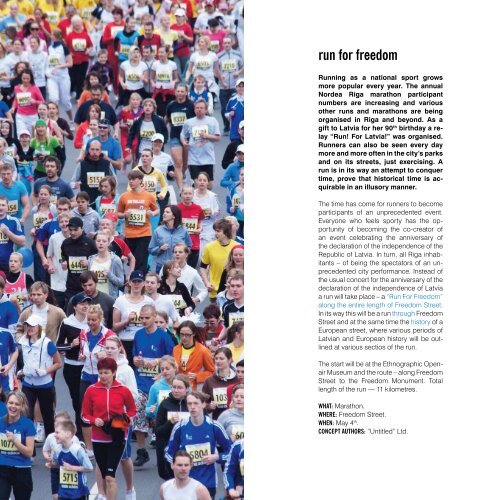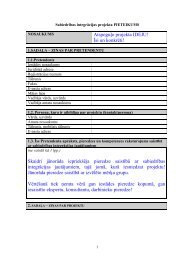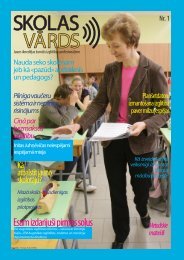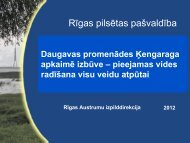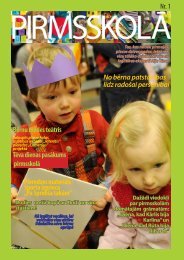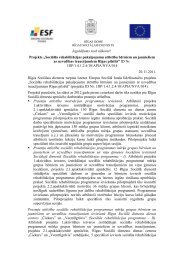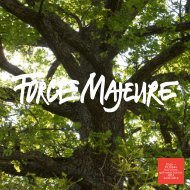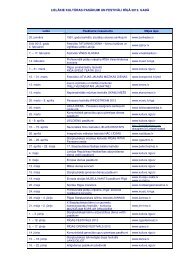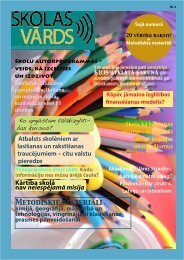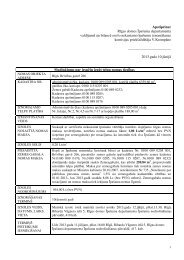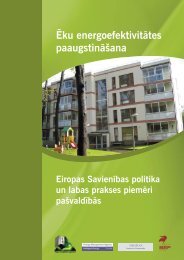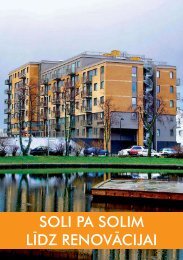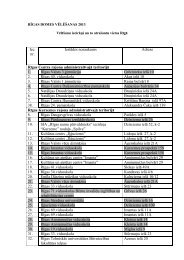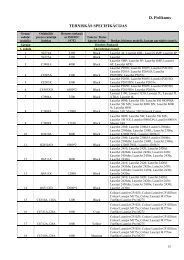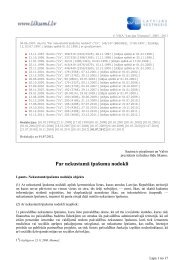Riga - European Capital of Culture 2014 candidate
Riga - European Capital of Culture 2014 candidate
Riga - European Capital of Culture 2014 candidate
- No tags were found...
Create successful ePaper yourself
Turn your PDF publications into a flip-book with our unique Google optimized e-Paper software.
un for freedomRunning as a national sport growsmore popular every year. The annualNordea <strong>Riga</strong> marathon participantnumbers are increasing and variousother runs and marathons are beingorganised in <strong>Riga</strong> and beyond. As agift to Latvia for her 90 th birthday a relay“Run! For Latvia!” was organised.Runners can also be seen every daymore and more <strong>of</strong>ten in the city’s parksand on its streets, just exercising. Arun is in its way an attempt to conquertime, prove that historical time is acquirablein an illusory manner.propagandaBecause <strong>of</strong> its geopolitical situationLatvia has always been the stage forvarious <strong>European</strong> political ideas, uponwhich political campaigns vibrate, influencedby the most diverse currents,ideas, movements, tendencies andhistoric turning points. Power, for workwith the masses, chooses the most diversetools— including art.Since the renewal <strong>of</strong> Latvia’s independence,5 parliamentary elections have alreadytaken place and in total, an independentLatvian parliament has already beenelected 9 times. Every time elections approacha certain tension can be observedamongst political powers; promises aremade, publicity campaigns created. Theintended project would demonstrate thedevelopment <strong>of</strong> political ideas and the instrumentsused by them over the centuryup to today. The intention <strong>of</strong> the exhibition“Political propaganda history in Latvia” isto gather political posters and party politicalposters that have been created beforethe establishment <strong>of</strong> the Latvian state,during Latvia’s initial independence andafter renewal <strong>of</strong> Latvia’s statehood. Itis intended to demonstrate all politicalcampaigns and pre-election publicity campaignsin chronological order, confrontingartistic facts with real historic events, whichthe campaigns feature, thus developingboth a collection <strong>of</strong> serious historicalmaterial and bringing a smile to the faces<strong>of</strong> exhibition guests regarding the role <strong>of</strong>propaganda tools or campaign posters inthe public’s choice.What: Exhibition.Where: <strong>Riga</strong> Art Space.When: August - October.Concept authors: <strong>Riga</strong>’s ECC task group.Cooperation partners: Latvian Art Directors’Club, advertising agencies.The time has come for runners to becomeparticipants <strong>of</strong> an unprecedented event.Everyone who feels sporty has the opportunity<strong>of</strong> becoming the co-creator <strong>of</strong>an event celebrating the anniversary <strong>of</strong>the declaration <strong>of</strong> the independence <strong>of</strong> theRepublic <strong>of</strong> Latvia. In turn, all <strong>Riga</strong> inhabitants– <strong>of</strong> being the spectators <strong>of</strong> an unprecedentedcity performance. Instead <strong>of</strong>the usual concert for the anniversary <strong>of</strong> thedeclaration <strong>of</strong> the independence <strong>of</strong> Latviaa run will take place – a “Run For Freedom”along the entire length <strong>of</strong> Freedom Street.In its way this will be a run through FreedomStreet and at the same time the history <strong>of</strong> a<strong>European</strong> street, where various periods <strong>of</strong>Latvian and <strong>European</strong> history will be outlinedat various sectios <strong>of</strong> the run.The start will be at the Ethnographic OpenairMuseum and the route – along FreedomStreet to the Freedom Monument. Totallength <strong>of</strong> the run — 11 kilometres.What: Marathon.Where: Freedom Street.When: May 4 th .Concept authors: “Untitled” Ltd.voice from the past ineisenstein’s birthplaceProvocative pro<strong>of</strong> that Europe’s andLatvia’s mental space always hasbeen and is united: an opportunityto be convinced that Latvian cinemaclassics have worked and thought ona global level. A review <strong>of</strong> classic filmsin their black and white tonality like avoice from the past seem to contrastwith the contemporary multi-colouredcity environment, but at the same timesurprise us with the topicality <strong>of</strong> eternalproblems, which makes us thinkabout intransient values that will stillbe significant in the distant future.One <strong>of</strong> the world’s most distinguishedcinema directors Sergej Eisentein is from<strong>Riga</strong>, and he proved that outstanding cinemalanguage is compatible with undisguisedpropaganda. His film “BattleshipPotemkin” is recognised as one <strong>of</strong> the alltime20 best films. Cinema, since its beginning,has always served as an instrument<strong>of</strong> power, searching for means <strong>of</strong> artisticexpression between terms dictated bypower and artistic and human protest. <strong>Riga</strong>inhabitants are characteristic with their particularattitude towards cinema and theircharacteristic cinephilia has arisen froma restricted access to the <strong>European</strong> cinemaculture heritage during the Cold Warand the search for their identity in nationalcinema.The films will be shown in an urban environment- large-scale open-air sessions onopen-air screens on city squares, in parksand beyond. It will be the border expansion <strong>of</strong>cinema’s territorial consciousness and interactionbetween selected works <strong>of</strong> <strong>European</strong>cinema classics (<strong>European</strong> Cinema Greats)and the restored Latvian cinema heritage(Latvian Cinema Greats). This project is alsoan opportunity for the expansion <strong>of</strong> timeborders — unlike usual cultural events, themost favourable time for open-air cinemasessions is in the evening hours <strong>of</strong> dusk,when cinema projections with their appealand particular magic would attract youngpeople and other groups <strong>of</strong> society.In 2008, the State Agency National FilmCentre <strong>of</strong> Latvia began work on the restoration<strong>of</strong> the Latvian cinema heritage and plansto finish the restoration <strong>of</strong> about 100 films by<strong>2014</strong>. Of the renewed films it will be possibleto make the most precise selection, whichwill interplay with <strong>European</strong> cinema classicsand will provide an insight into the best examples<strong>of</strong> our cinema culture heritage.The <strong>Riga</strong> Cinema Museum and theNational Film Centre <strong>of</strong> Latvia propose aconceptual selection <strong>of</strong> <strong>European</strong> CinemaGreats – demonstrating one film fromevery <strong>European</strong> country (for example,Michelangelo Antonioni from Italy,Sergei Eisenstein from Russia, Jean-LucGodard from France, Louis Bunuel formSpain, Andrzej Wajda from Poland, AkiKaurismaki from Finland, Ingmar Bergmanfrom Sweden, Vera Chytilova from theCzech Republic, etc.). In <strong>2014</strong>, they wouldall meet for the first time in <strong>Riga</strong> and taketheir places next to the pearls <strong>of</strong> Latviancinema classics.What: Open-air cinema sessions.Where: City squares, suburbs.When: June-September.Concept authors and organisers: <strong>Riga</strong> CinemaMuseum, National Film Centre <strong>of</strong> Latvia.Cooperation partners: Danish CulturalCentre, Nordic Country InformationCentre, French Cultural Centre.56 57


